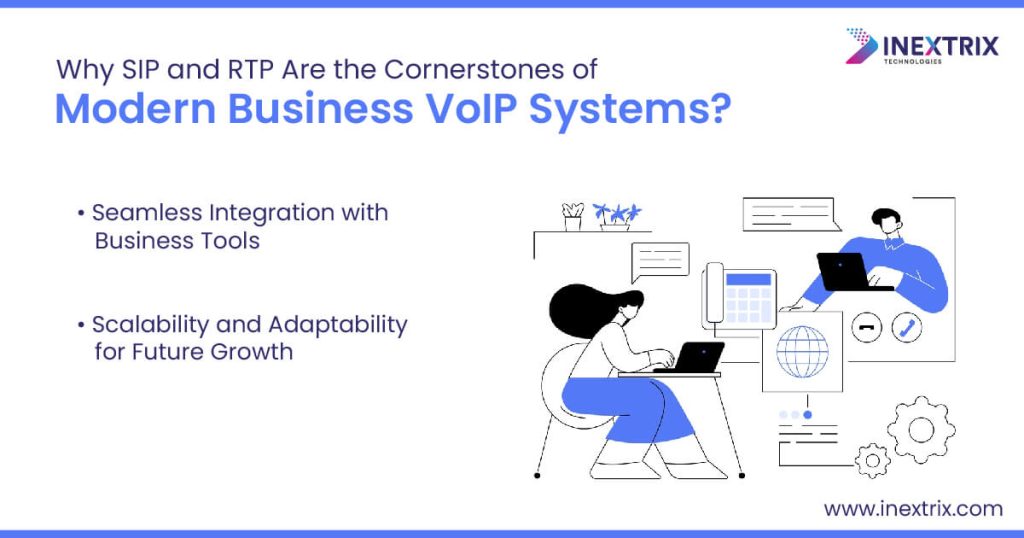Communication technology has advanced, but businesses still encounter hurdles when establishing a reliable VoIP system. The complexity arises from integrating various protocols that manage everything from call setup to voice transmission. These challenges can hinder the overall efficiency of a VoIP communication system.
For businesses seeking to overcome these barriers, custom VoIP development presents the perfect solution. This approach tailors VoIP systems to individual business needs, ensuring seamless communication through efficient protocols like SIP and RTP. Understanding the roles of these protocols is crucial for developing robust VoIP systems that support modern communication requirements.
SIP: Orchestrating Communication Sessions
It is the signaling protocol responsible for setting up, managing, and terminating communication sessions. It ensures that the session is established and maintained until completion. This is true for voice calls, video conferences, or real time messaging.
SIP in custom VoIP development can create highly flexible communication systems. Certainly, it handles large volumes of traffic efficiently. Undoubtedly, SIP manages the signalling. Moreover, it allows businesses to scale their VoIP systems effortlessly. This flexibility is crucial for companies experiencing growth or requiring more advanced communication features without needing to overhaul their infrastructure.
Moreover, SIP can integrate with other business tools. For example, customer relationship management (CRM) and enterprise resource planning (ERP) systems integration with SIP enhances business productivity and streamlines communication workflows.
RTP: Ensuring Smooth Media Transmission
While SIP handles the session management, RTP (Real-Time Transport Protocol) focuses on the actual media transmission. RTP ensures that audio and video data are transmitted with minimal delay. Moreover, it allows real time communication without noticeable lags or disruptions.
This is where RTP becomes a transformative technology in VoIP development services. It allows for real time voice and video data streaming. Certainly, it ensures quality remains high, even when dealing with long distance communication. For businesses that rely heavily on conferencing and real time customer support, RTP guarantees that media quality is maintained throughout the communication process.
Additionally, RTP’s built-in error detection capabilities mean that any packet loss or disruption in the data stream can be quickly addressed. Certainly, it keeps the conversation flowing smoothly. This leads to a much more reliable communication system that businesses can trust for critical operations.
What Is Custom VoIP Development?
It is a practice followed by businesses to create a tailored VoIP communication system based on the specific needs of a business. Unlike out-of-the-box VoIP solutions, custom VoIP development services allow for the integration of features and functionalities. Certainly, they are unique to an organization’s workflow. It involves building a communication ecosystem that leverages SIP and RTP protocols to ensure seamless call handling and media transmission.
By choosing custom development, businesses gain the flexibility to incorporate additional functionalities. For example, enhanced security, custom call routing, advanced analytics, and much more are available. This approach also ensures scalability, allowing the system to grow with the business, without significant restructuring. The core benefit is that custom VoIP development gives businesses complete control over their communication infrastructure, ensuring optimal performance and reliability.
For a deeper understanding of how VoIP staff augmentation can accelerate your startup’s time-to-market, explore this recommended article. It delves into how outsourcing specialized VoIP development services can help startups quickly build and deploy communication solutions while reducing operational costs and ensuring flexibility.
Custom VoIP Development: Integrating SIP and RTP for Tailored Solutions

One of the biggest advantages of using SIP and RTP within VoIP development services is the ability to tailor communication solutions to specific business needs. Custom development allows companies to integrate these protocols into a system that perfectly aligns with their unique operational requirements.
For example, a company may need specific call routing features, enhanced security measures, or the ability to handle large scale multi tenant IP PBX solutions seamlessly. By leveraging SIP’s scalability and RTP’s real time media capabilities, custom VoIP solutions can be built to handle these needs effortlessly.
Furthermore, the integration of SIP and RTP with other business tools further enhances collaboration and productivity, creating a communication ecosystem that grows with the business. Businesses can customize the features and scale the system without facing the limitations that come with off-the-shelf VoIP solutions with custom VoIP development.
Seamless Integration with Business Tools
Another key benefit of utilizing SIP and RTP is their compatibility with other essential business applications. These protocols can be integrated with CRM systems, ERP tools, and other business software, creating a unified communication platform that improves collaboration and enhances customer experience.
For example, a call initiated via SIP can trigger automated CRM actions, such as logging call details or updating customer records. Similarly, RTP ensures that the quality of media streams remains consistent, improving client interactions during video calls or web conferences. By integrating these systems into a custom VoIP development framework, businesses can centralize their communication channels and improve operational efficiency.
Scalability and Adaptability for Future Growth
One of the standout features of using SIP and RTP while using VoIP development services is their ability to scale with the growing needs of a business. As communication demands increase, these protocols can easily adapt to manage more users, additional communication features, or higher data volumes.
For businesses that depend on real time communication, this scalability is invaluable. Whether a business is expanding its operations or requiring more sophisticated features like advanced call analytics or video conferencing, SIP and RTP ensure that the VoIP system can handle these new requirements without significant disruption.
In custom VoIP development services, the ability to scale effortlessly is crucial for businesses aiming for long-term growth. A system built on SIP and RTP can evolve alongside the business, ensuring a robust and future-proof communication solution.
Concluding Notes
SIP and RTP are essential for building effective VoIP communication systems, each playing a distinct yet complementary role. SIP handles the signaling and call setup, while RTP ensures the quality of the media transmitted during these sessions. Together, they provide the technical foundation that supports the efficiency and scalability of VoIP systems.
For businesses that require flexible, scalable, and high-quality communication systems, VoIP development services are the answer. It offers a tailored solution that integrates these powerful protocols, ensuring seamless operation and optimal performance. By leveraging SIP and RTP within custom VoIP development, businesses can overcome communication challenges and build systems that grow with their needs.
Our VoIP development services provide businesses with the ability to create tailored communication systems that meet specific operational needs. With the power of SIP and RTP protocols integrated into custom VoIP development, your business can achieve seamless communication at scale. To initiate this discussion, contact us NOW.


